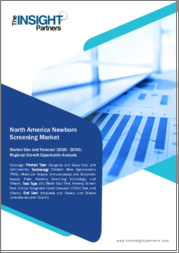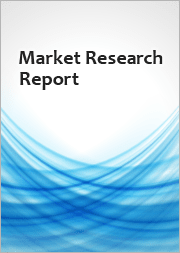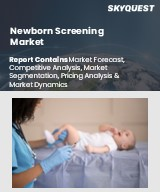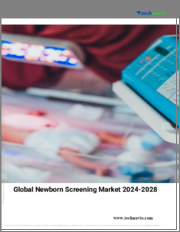
|
시장보고서
상품코드
1463686
북미의 신생아 스크리닝 시장 전망(-2030년) : 지역별 분석 - 제품 유형, 기술, 검사 유형, 최종 사용자별North America Newborn Screening Market Forecast to 2030 - Regional Analysis - by Product Type (Reagents and Assay Kits, and Instruments), Technology, Test Type, and End User (Hospitals and Clinics, and Diagnostic Laboratories) |
||||||
북미의 신생아 스크리닝 시장은 2022년 5억 2,155만 달러로 평가되었습니다. 2030년에는 10억 8,230만 달러에 달할 것으로 예상되며, 2022-2030년간 9.6%의 연평균 복합 성장률(CAGR)을 나타낼 전망입니다.
신생아 스크리닝에 대한 정부 지원금 급증으로 북미의 신생아 스크리닝 시장 성장 촉진
각국 정부는 신생아 선별 검사 프로그램에 자금을 할당하고 있습니다. 선천성 및 유전성 질환은 발견되지 않은 채 방치되면 심각한 건강 합병증과 대규모 의료 개입을 유발할 수 있기 때문에 이러한 프로그램은 어린이와 부모의 장기적인 건강 관리 비용을 줄이는 데 도움이 될 수 있습니다. 영유아기 건강 문제를 식별하고 이를 해결함으로써 정부는 국민의 건강과 복지를 향상시킬 수 있습니다. 따라서 신생아 스크리닝은 국민 전체의 건강을 개선하고 의료 시스템의 부담을 줄이는 광범위한 공중 보건의 목적에 부합합니다.
정부의 재정 지원은 의료 서비스 접근의 형평성을 촉진하고, 사회경제적 지위에 관계없이 모든 사람이 신생아 스크리닝 서비스를 받을 수 있도록 합니다. 이러한 포괄성은 다양한 인구통계학적 그룹 간의 의료 성과 격차를 방지하기 위해 질병의 조기 발견과 조기 개입에 필수적입니다. 각국 정부가 신생아 스크리닝에 대한 재정적 지원과 정책적 지원을 늘리고 우선순위를 부여함에 따라 신생아 스크리닝 시장은 전 세계적으로 지속적으로 성장하고 있습니다.
북미의 신생아 스크리닝 시장 개요
북미의 신생아 스크리닝 시장은 최근 몇 년동안 괄목할 만한 성장을 거듭하고 있습니다. 선천성 질환을 확인하고 관리하기 위한 조기 검진의 중요성에 대한 부모와 의료 전문가들의 인식이 높아짐에 따라 신생아 스크리닝 서비스에 대한 수요가 크게 증가하고 있습니다. 또한, 의료 기술의 발전은 신생아 스크리닝 역량을 향상시키는 데 매우 중요하며, 검사실의 자동화는 선별검사의 정확성, 속도, 비용 효율성을 향상시키고 있습니다. 이를 통해 의료 전문가들은 보다 광범위한 유전 및 대사 질환을 포괄하는 철저한 신생아 스크리닝 패널을 제공할 수 있게 되었습니다. 유리한 법률 및 규제 조치도 북미의 신생아 스크리닝 시장에 도움이 되고 있습니다. 많은 주와 주에서 신생아 스크리닝 의무화 프로그램을 시행하고 있으며, 모든 영아가 출생 직후에 검진을 받을 수 있도록 하고 있습니다. 예를 들어, 미국에서는 각 주에서 공중보건 프로그램으로 신생아 스크리닝을 시행하고 있으며, 연간 약 400만 명의 영아들이 이 프로그램을 통해 출생 시에는 잘 나타나지 않는 질병에 대한 검진을 받고 있습니다. 텍사스 주 보건 복지부는 2021년 6월부터 척수성 근위축증(SMA)에 대한 신생아 스크리닝을 시작했습니다.
유전자 이상과 선천성 질환 증가로 인해 신생아 스크리닝의 중요성이 부각되고 있습니다. 미국 국립보건원(NIH)은 버팔로 대학의 연구진에게 희귀하고 치명적인 세 가지 유전성 질환에 대한 신생아 스크리닝의 정확도를 크게 향상시키기 위한 노력으로 개발된 국제 프로젝트를 주도하기 위해 경쟁률이 높은 R01 보조금을 지급했습니다. 또한, NIH의 유니스 케네디 슈라이버 국립 소아보건 및 인간발달연구소는 5년간 380만 달러의 보조금을 제공했습니다. 이처럼 북미의 신생아 스크리닝 시장은 인식 개선, 기술 발전, 지원 정책, 선천성 질환의 유병률 증가로 인해 확대되고 있습니다.
북미의 신생아 스크리닝 시장 매출 및 2030년까지의 예측(금액)
북미의 신생아 스크리닝 시장 세분화
북미의 신생아 스크리닝 시장은 제품 유형, 기술, 검사 유형, 최종 사용자, 국가별로 분류됩니다.
제품 유형에 따라 북미의 신생아 스크리닝 시장은 시약 및 분석 키트와 기기로 구분되며, 2022년 북미의 신생아 스크리닝 시장 점유율은 시약 및 분석 키트 부문이 가장 큰 비중을 차지할 것입니다. 시약 및 분석 키트 부문은 DNA 기반 분석, 면역 분석, 효소 분석으로 세분화됩니다. 장비 부문은 신생아 장애 선별 장비, 맥박 산소 측정기, 신생아 청각 선별 장비 및 기타 장비로 세분화됩니다.
기술 측면에서 북미의 신생아 스크리닝 시장은 탠덤 질량 분석(TMS), 분자 분석, 면역 분석 및 효소 분석, 맥박 산소 측정 검사 기술, 기타 기술로 분류됩니다. 맥박 산소 측정 검사 기술 부문은 2022년 북미 신생아 선별 검사 시장에서 가장 큰 점유율을 차지했습니다.
검사 유형에 따라 북미의 신생아 스크리닝 시장은 건혈반점 검사, 청력검사, 중증 선천성 심장병(CCHD) 검사, 기타 검사 유형으로 분류되며, 2022년 북미의 신생아 스크리닝 시장 점유율은 건혈반점 검사 분야가 가장 큰 비중을 차지했습니다.
최종 사용자별로 북미의 신생아 스크리닝 시장은 병원 및 클리닉과 진단 실험실로 구분됩니다. 병원 및 클리닉 부문은 2022년 북미의 신생아 스크리닝 시장 점유율에서 더 큰 비중을 차지했습니다.
국가별로 북미의 신생아 스크리닝 시장은 미국, 캐나다, 멕시코로 분류됩니다. 미국은 2022년 북미의 신생아 스크리닝 시장을 독점했습니다.
Baebies Inc, Bio-Rad Laboratories Inc, Masimo Corp, Medtronic Plc, Natus Medical Inc, PerkinElmer Inc, Waters Corp는 북미의 신생아 스크리닝 시장에서 활동하는 주요 기업입니다.
목차
목차
제1장 서론
제2장 주요 요약
- 주요 인사이트
제3장 조사 방법
- 조사 범위
- 2차 조사
- 1차 조사
제4장 북미의 신생아 스크리닝 시장 : 주요 산업 역학
- 시장 성장 촉진요인
- 주요 시장 성장 억제요인
- 주요 시장 기회
- 향후 동향
- 영향 분석
제5장 신생아 스크리닝 시장 : 북미 시장 분석
- 북미의 신생아 스크리닝 시장 매출, 2022년-2030년
제6장 북미의 신생아 스크리닝 시장 - 매출과 예측(-2030년) : 제품 유형별
- 시장 매출 점유율, 2022년 및 2030년
- 시약 및 어세이 키트
- 기기
제7장 북미의 신생아 스크리닝 시장 - 매출과 예측(-2030년) : 기술별
- 시장 매출 점유율, 2022년 및 2030년
- 텐덤 질량분석(TMS)
- 분자 어세이
- 면역 어세이 및 효소 어세이
- 산소포화도 측정 및 스크리닝 기술
- 기타 기술
제8장 북미의 신생아 스크리닝 시장 - 매출과 예측(-2030년) : 검사 유형별
- 시장 매출 점유율, 2022년 및 2030년
- 건조 혈액 스포트 검사
- 청각 스크리닝 검사
- 중증 선천성 심질환(CCHD) 검사
- 기타 검사 유형
제9장 북미의 신생아 스크리닝 시장 - 매출과 예측(-2030년) : 최종사용자별
- 시장 매출 점유율, 2022년 및 2030년
- 병원 및 진료소
- 진단 실험실
제10장 북미의 신생아 스크리닝 시장 : 국가별 분석
- 미국
- 캐나다
- 멕시코
제11장 북미의 신생아 스크리닝 시장 - 업계 상황
- 신생아 스크리닝 시장 성장 전략
- 유기적 성장 전략
- 무기적 성장 전략
제12장 기업 개요
- PerkinElmer Inc
- Waters Corp
- Bio-Rad Laboratories Inc
- Masimo Corp
- Natus Medical Inc.
- Baebies Inc
- Medtronic Plc
제13장 부록
LSH 24.05.22The North America newborn screening market was valued at US$ 521.55 million in 2022 and is expected to reach US$ 1,082.30 million by 2030; it is estimated to grow at a CAGR of 9.6% from 2022 to 2030.
Surging Government Funding for Newborn Screening Fuels the North America Newborn Screening Market
Governments of different countries are increasingly allocating funds for newborn screening programs. These programs help reduce long-term healthcare costs for children and their parents as congenital and genetic disorders could result in severe health complications and extensive medical interventions if left undetected. By identifying and addressing health issues in infancy, governments can enhance the health and well-being of their citizens. Thus, newborn screening aligns with broader public health objectives to improve overall population health and reduce the burden on healthcare systems.
Government funding promotes equity in healthcare access, ensuring that newborn screening services are available to all, regardless of socioeconomic status. This inclusivity is essential for early disease detection and intervention, as it prevents disparities in healthcare outcomes among different demographic groups. As governments continue to prioritize newborn screening through increased funding and policy support, the newborn screening market has been experiencing sustainable growth worldwide.
North America Newborn Screening Market Overview
The newborn screening market in North America has experienced significant growth in recent years. The demand for newborn screening services has increased significantly with the surging awareness among parents and healthcare professionals about the importance of early screening for identifying and managing congenital disorders. Additionally, improvements in medical technology have been crucial in enhancing newborn screening capabilities-automation in laboratories has boosted screening accuracy, speed, and cost-effectiveness. This has made it possible for medical professionals to give thorough newborn screening panels that cover a larger spectrum of genetic and metabolic disorders. Favorable legislation and regulatory measures also benefit the newborn screening market in North America. Many states and provinces have implemented mandatory newborn screening programs, ensuring all infants are screened shortly after birth. For instance, every state in the US offers newborn screening as a public health program; yearly, ~4 million babies are screened under this program for illnesses that aren't often present at the time of delivery. The Texas Department of Health and Human Services began screening newborn for Spinal Muscular Atrophy (SMA) in June 2021.
The rising prevalence of genetic abnormalities and congenital problems has highlighted the significance of newborn screening. The National Institutes of Health has given a researcher from the University at Buffalo a highly competitive R01 grant to lead an international project developed as an effort to significantly increase the accuracy of newborn screening for three rare, frequently fatal genetic diseases. Further, the Eunice Kennedy Shriver National Institute of Child Health and Human Development of the NIH funds the US$ 3.8 million five-year award. Thus, the newborn screening market in North America is increasing with increased awareness, technological advancements, supportive policies, and growing congenital disorder prevalence.
North America Newborn Screening Market Revenue and Forecast to 2030 (US$ Million)
North America Newborn Screening Market Segmentation
The North America newborn screening market is segmented based on product type, technology, test type, end user, and country.
Based on product type, the North America newborn screening market is bifurcated into reagents and assay kits, and instruments. The reagents and assay kits segment held a larger North America newborn screening market share in 2022. The reagents and assay segment kits is subsegmented into DNA-based assays, and immunoassays and enzymatic assays. Instruments segment is subsegmented into newborn disorder screening instruments, pulse oximeters, newborn hearing screening instruments, and other instruments.
In terms of technology, the North America newborn screening market is categorized into tandem mass spectrometry (TMS), molecular assays, immunoassays and enzymatic assay, pulse oximetry screening technology, and other technologies. The pulse oximetry screening technology segment held the largest North America newborn screening market share in 2022.
Based on test type, the North America newborn screening market is categorized into dry blood spot test, hearing screen test, critical congenital heart diseases (CCHD) test, and other test types. The dry blood spot test segment held the largest North America newborn screening market share in 2022.
By end user, the North America newborn screening market is segmented into hospitals and clinics and diagnostic laboratories. The hospitals and clinics segment held a larger North America newborn screening market share in 2022.
Based on country, the North America newborn screening market is categorized into the US, Canada, and Mexico. The US dominated the North America newborn screening market in 2022.
Baebies Inc, Bio-Rad Laboratories Inc, Masimo Corp, Medtronic Plc, Natus Medical Inc, PerkinElmer Inc, and Waters Corp are some of the leading companies operating in the North America newborn screening market.
Table Of Contents
Table of Content
1. Introduction
- 1.1 The Insight Partners Research Report Guidance
- 1.2 Market Segmentation
2. Executive Summary
- 2.1 Key Insights
3. Research Methodology
- 3.1 Coverage
- 3.2 Secondary Research
- 3.3 Primary Research
4. North America Newborn Screening Market - Key Industry Dynamics
- 4.1 Key Market Drivers
- 4.1.1 Surging Government Funding for Newborn Screening
- 4.1.2 Rising Burden of Congenital Diseases
- 4.1.3 Increasing Prevalence of Newborn Disorders
- 4.2 Key Market Restraints
- 4.2.1 Lack of Uniformity in Newborn Screening Policies and Practices
- 4.3 Key Market Opportunities
- 4.3.1 Genetic Screening of Newborns
- 4.4 Future Trends
- 4.4.1 Integration of Machine Learning and Artificial Intelligence in Screening
- 4.5 Impact Analysis:
5. Newborn Screening Market - North America Market Analysis
- 5.1 North America Newborn Screening Market Revenue (US$ Mn), 2022 - 2030
6. North America Newborn Screening Market - Revenue and Forecast to 2030 - by Product Type
- 6.1 Overview
- 6.2 North America Newborn Screening Market Revenue Share, by Product Type, 2022 & 2030 (%)
- 6.3 Reagents and Assay Kits
- 6.3.1 Overview
- 6.3.2 Reagents and Assay Kits: North America Newborn Screening Market - Revenue and Forecast to 2030 (US$ Million)
- 6.3.2.1 North America Newborn Screening Market, by Reagents and Assay Kits, 2020-2030 (US$ Million)
- 6.4 Instruments
- 6.4.1 Overview
- 6.4.2 Instruments: North America Newborn Screening Market - Revenue and Forecast to 2030 (US$ Million)
- 6.4.2.1 North America Newborn Screening Market, by Instruments, 2020-2030 (US$ Million)
7. North America Newborn Screening Market - Revenue and Forecast to 2030 - by Technology
- 7.1 Overview
- 7.2 North America Newborn Screening Market Revenue Share, by Technology 2022 & 2030 (%)
- 7.3 Tandem Mass Spectrometry (TMS)
- 7.3.1 Overview
- 7.3.2 Tandem Mass Spectrometry (TMS): North America Newborn Screening Market - Revenue and Forecast to 2030 (US$ Million)
- 7.4 Molecular Assays
- 7.4.1 Overview
- 7.4.2 Molecular Assays: North America Newborn Screening Market - Revenue and Forecast to 2030 (US$ Million)
- 7.5 Immunoassays and Enzymatic Assays
- 7.5.1 Overview
- 7.5.2 Immunoassays and Enzymatic Assays: North America Newborn Screening Market - Revenue and Forecast to 2030 (US$ Million)
- 7.6 Pulse Oximetry Screening Technology
- 7.6.1 Overview
- 7.6.2 Pulse Oximetry Screening Technology: North America Newborn Screening Market - Revenue and Forecast to 2030 (US$ Million)
- 7.7 Other Technologies
- 7.7.1 Overview
- 7.7.2 Other Technologies: North America Newborn Screening Market - Revenue and Forecast to 2030 (US$ Million)
8. North America Newborn Screening Market - Revenue and Forecast to 2030 - by Test Type
- 8.1 Overview
- 8.2 North America Newborn Screening Market Revenue Share, by Test Type 2022 & 2030 (%)
- 8.3 Dry Blood Spot Test
- 8.3.1 Overview
- 8.3.2 Dry Blood Spot Test: North America Newborn Screening Market - Revenue and Forecast to 2030 (US$ Million)
- 8.4 Hearing Screen Test
- 8.4.1 Overview
- 8.4.2 Hearing Screen Test: North America Newborn Screening Market - Revenue and Forecast to 2030 (US$ Million)
- 8.5 Critical Congenital Heart Diseases (CCHD) Test
- 8.5.1 Overview
- 8.5.2 Critical Congenital Heart Diseases (CCHD) Test: North America Newborn Screening Market - Revenue and Forecast to 2030 (US$ Million)
- 8.6 Other Test Types
- 8.6.1 Overview
- 8.6.2 Other Test Types: North America Newborn Screening Market - Revenue and Forecast to 2030 (US$ Million)
9. North America Newborn Screening Market - Revenue and Forecast to 2030 - by End User
- 9.1 Overview
- 9.2 North America Newborn Screening Market Revenue Share, by End User, 2022 & 2030 (%)
- 9.3 Hospitals and Clinics
- 9.3.1 Overview
- 9.3.2 Hospitals and Clinics: North America Newborn Screening Market - Revenue and Forecast to 2030 (US$ Million)
- 9.4 Diagnostic Laboratories
- 9.4.1 Overview
- 9.4.2 Diagnostic Laboratories: North America Newborn Screening Market - Revenue and Forecast to 2030 (US$ Million)
10. North America Newborn Screening Market - Country Analysis
- 10.1 North America Newborn Screening Market, Revenue and Forecast To 2030
- 10.1.1 North America Newborn Screening Market, by Country
- 10.1.1.1 US
- 10.1.1.1.1 US Newborn Screening Market Revenue and Forecast to 2030 (US$ Mn)
- 10.1.1.1.2 US: Newborn Screening Market, by Product Type, 2020-2030 (US$ Million)
- 10.1.1.1.2.1 US: Newborn Screening Market, For Reagents and Assay Kits by Product Type, 2020-2030 (US$ Million)
- 10.1.1.1.2.2 US: Newborn Screening Market, For Instruments by Product Type, 2020-2030 (US$ Million)
- 10.1.1.1.3 US: Newborn Screening Market, by Technology, 2020-2030 (US$ Million)
- 10.1.1.1.4 US: Newborn Screening Market, by Test Type, 2020-2030 (US$ Million)
- 10.1.1.1.5 US: Newborn Screening Market, by End User, 2020-2030 (US$ Million)
- 10.1.1.2 Canada
- 10.1.1.2.1 Canada Newborn Screening Market Revenue and Forecast to 2030 (US$ Mn)
- 10.1.1.2.2 Canada: Newborn Screening Market, by Product Type, 2020-2030 (US$ Million)
- 10.1.1.2.2.1 Canada: Newborn Screening Market, For Reagents and Assay Kits by Product Type, 2020-2030 (US$ Million)
- 10.1.1.2.2.2 Canada: Newborn Screening Market, For Instruments by Product Type, 2020-2030 (US$ Million)
- 10.1.1.2.3 Canada: Newborn Screening Market, by Technology, 2020-2030 (US$ Million)
- 10.1.1.2.4 Canada: Newborn Screening Market, by Test Type, 2020-2030 (US$ Million)
- 10.1.1.2.5 Canada: Newborn Screening Market, by End User, 2020-2030 (US$ Million)
- 10.1.1.3 Mexico
- 10.1.1.3.1 Mexico Newborn Screening Market Revenue and Forecast to 2030 (US$ Mn)
- 10.1.1.3.2 Mexico: Newborn Screening Market, by Product Type, 2020-2030 (US$ Million)
- 10.1.1.3.2.1 Mexico: Newborn Screening Market, For Reagents and Assay Kits by Product Type, 2020-2030 (US$ Million)
- 10.1.1.3.2.2 Mexico: Newborn Screening Market, For Instruments by Product Type, 2020-2030 (US$ Million)
- 10.1.1.3.3 Mexico: Newborn Screening Market, by Technology, 2020-2030 (US$ Million)
- 10.1.1.3.4 Mexico: Newborn Screening Market, by Test Type, 2020-2030 (US$ Million)
- 10.1.1.3.5 Mexico: Newborn Screening Market, by End User, 2020-2030 (US$ Million)
- 10.1.1.1 US
- 10.1.1 North America Newborn Screening Market, by Country
11. North America Newborn Screening Market-Industry Landscape
- 11.1 Overview
- 11.2 Growth Strategies in Newborn Screening Market
- 11.3 Organic Growth Strategies
- 11.3.1 Overview
- 11.4 Inorganic Growth Strategies
- 11.4.1 Overview
12. Company Profiles
- 12.1 PerkinElmer Inc
- 12.1.1 Key Facts
- 12.1.2 Business Description
- 12.1.3 Products and Services
- 12.1.4 Financial Overview
- 12.1.5 SWOT Analysis
- 12.1.6 Key Developments
- 12.2 Waters Corp
- 12.2.1 Key Facts
- 12.2.2 Business Description
- 12.2.3 Products and Services
- 12.2.4 Financial Overview
- 12.2.5 SWOT Analysis
- 12.2.6 Key Developments
- 12.3 Bio-Rad Laboratories Inc
- 12.3.1 Key Facts
- 12.3.2 Business Description
- 12.3.3 Products and Services
- 12.3.4 Financial Overview
- 12.3.5 SWOT Analysis
- 12.3.6 Key Developments
- 12.4 Masimo Corp
- 12.4.1 Key Facts
- 12.4.2 Business Description
- 12.4.3 Products and Services
- 12.4.4 Financial Overview
- 12.4.5 SWOT Analysis
- 12.4.6 Key Developments
- 12.5 Natus Medical Inc.
- 12.5.1 Key Facts
- 12.5.2 Business Description
- 12.5.3 Products and Services
- 12.5.4 Financial Overview
- 12.5.5 SWOT Analysis
- 12.5.6 Key Developments
- 12.6 Baebies Inc
- 12.6.1 Key Facts
- 12.6.2 Business Description
- 12.6.3 Products and Services
- 12.6.4 Financial Overview
- 12.6.5 SWOT Analysis
- 12.6.6 Key Developments
- 12.7 Medtronic Plc
- 12.7.1 Key Facts
- 12.7.2 Business Description
- 12.7.3 Products and Services
- 12.7.4 Financial Overview
- 12.7.5 SWOT Analysis
- 12.7.6 Key Developments
13. Appendix
- 13.1 About Us
- 13.2 Glossary of Terms



















